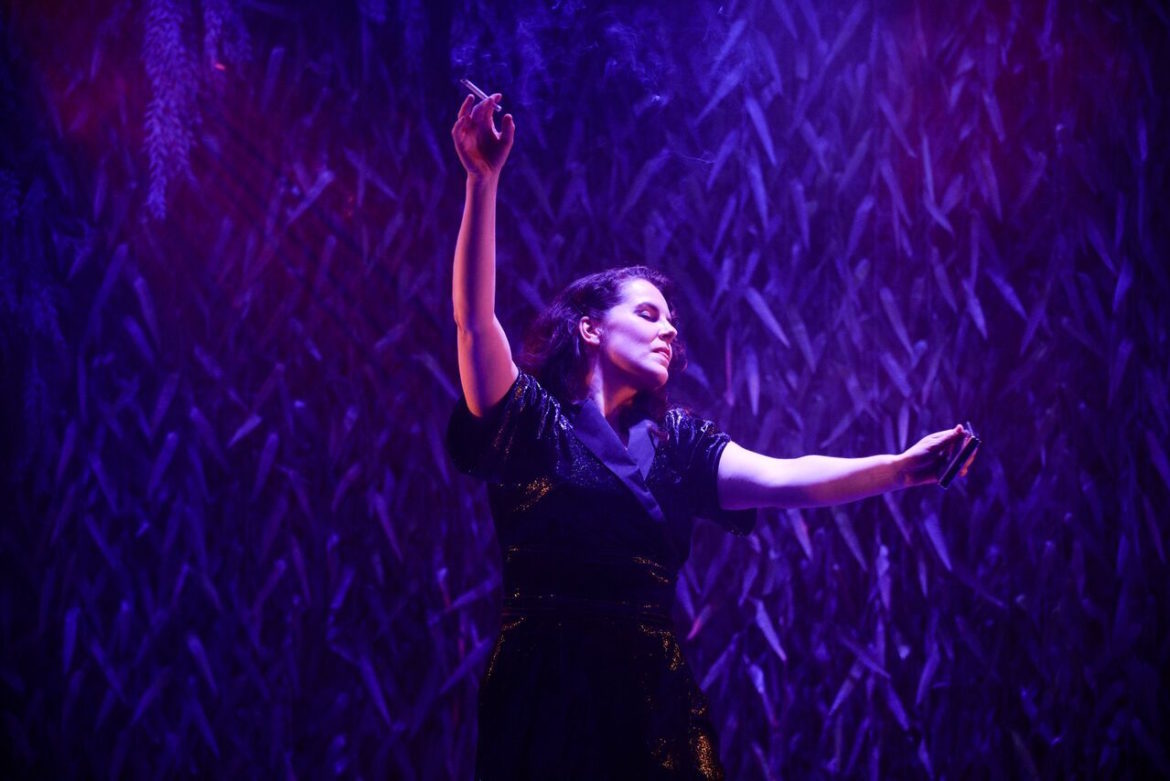Keith Gow ponders the positives and negatives of Tennessee Williams’ Suddenly Last Summer, in a new production from Red Stitch and Little Ones Theatre
“I think we ought to at least consider the possibility that the girl’s story could be true…”
Violet Venable needs a favour. She’s willing to make a large donation to support Dr Cukrowicz’s research, if he agrees to perform a lobotomy on her niece, Catharine. Violet is desperate to protect the reputation of her son, Sebastian, who died the previous summer. She needs Catharine to shut up about Sebastian’s homosexuality and the terrible nature of his death.
Tennessee Williams’ Southern Gothic melodrama, Suddenly Last Summer, is at once dated, problematically racist and a prescient examination of the current debate about the need to believe the stories of women, rather than dismissing them as hysterical. For a 60-year-old show, it has a lot to say to 2018. A co-production between Red Stitch and Little Ones Theatre, this production heightens the melodrama, as you might expect from director Stephen Nicolazzo. Its camp pierces through the social repressions of 1958, when the play debuted, and the darkness of 1936, the middle of the Great Depression, when the play is set.
The production is an odd mix of the hallmark qualities of these two companies: Red Stitch’s commitment to text-based theatre, and Little Ones’ reputation for stylised camp. Eugyeene Teh’s design – walls draped with long leaves, plants hanging from the rafters – plunges us into the mystery of the garden district of New Orleans. Even in the confined space of Red Stitch, the set bows to the Little Ones’ proscenium-arch aesthetic, with a widescreen look that evokes a feature film and somehow makes the space look bigger. Katie Sfetkidis’ lighting is elegant and moody, with layers of smoke and haze emphasising the oppressiveness of this family meeting.
There are moments when the performances are dialled a bit too far toward arch, playing against the drama inherent in Williams’ lyrical dialogue. The early scenes with Jennifer Vuletic’s Mrs Venable and Charles Purcell’s Doctor “Sugar” are particularly mannered, but perhaps this is about easing us into Nicolazzo’s particular style. The further into the show we move, the more the camp melodrama seems to click. Williams’ work is so revered for its language, it’s refreshing for a production to gently have fun with its indulgences.
The melding of these two companies is highlighted by the effective combination of their two acting ensembles. Little Ones have brought on board regulars like Jennifer Vuletic, Charles Purcell and Zoe Boesen; Red Stitch has contributed Harvey Zielinski, Caroline Lee and Kate Cole. However, at times it was like watching a television crossover, with the guest stars from one show not quite feeling at home in another.
Tennessee Williams mined his personal obsessions over and over again for the drama of his plays. Suddenly Last Summer digs into his relationship with his overbearing mother, his mentally-ill sister and his own closeted homosexuality, albeit less elegantly than in The Glass Menagerie. Here, to emphasise the Gothic, the primeval past intrudes on the present; even the beautiful garden contains such surprises as the Venus flytrap.
The play explores how we all use each other to get what we want and how destructive we can be under a civilised veneer. Under its surface of camp, Nicolazzo’s production has a stark sense of heightened realism. As Violet and her family retreat into a twisted tableau, poised and posed against the dark vines of the garden at the back of the space, Kate Cole takes centre stage as Catharine to recount her stories of her cousin’s demise. The question of whether Sebastian was “chased” or “chaste” recedes as she recounts the troubling details of his death.
Cole’s performance is riveting: we are drawn in to the murkiness of her memory, scarred by the things she has witnessed. In this strong cast, Cole literally and figuratively stands out. The “truth serum” that Catharine has been administered by Doctor Sugar ushers in a shaded, nuanced performance. As problematic as the content of Williams’ text is in the final scenes (it is deeply racist), the production drives its point home – beneath guilt, trauma and artifice lies the truth. We are forced to consider the possibility that this woman is a reliable witness to her own experience.
The last summer that Catharine describes takes place on holiday in Spain. As she discusses starving black children in the streets, the play ends up with an episode of cannibalism. Williams’ treats these black children as a mysterious “other”, a kind of punishment for Sebastian’s indiscretions and sexuality. This pushes it into full Gothic horror and made me question the wisdom of producing it, even with everything it accomplishes in discussing how women suffering mental illness and trauma have been and are treated.
While the production grapples with other dated concepts, it leaves this disturbing racist element unexamined. This tarnished the experience a bit. Otherwise, Suddenly Last Summer is dark, unsettling and delightful; sharp, intrusive and hilarious. I’ve felt in the past that Red Stitch should stay away from “the classics”, but when they bring in outside creatives to upend expectations, it raises their risk-taking and allows audiences another opportunity to see Little Ones queer a well-known narrative.
Suddenly Last Summer, by Tennessee Williams, directed by Stephen Nicolazzo. Set and costume design by Eugyeene Teh, sound design and composition by Dan Nixon, lighting design by Katie Sfetkidis. Performed by Kate Cole, Caroline Lee, Harvey Zielinski, Zoe Boesen, Chanella Macri, Charles Purcell, and Jennifer Vuletic. Red Stitch and Little Ones Theatre. Until November 4. Bookings
Red Stitch has no access information

